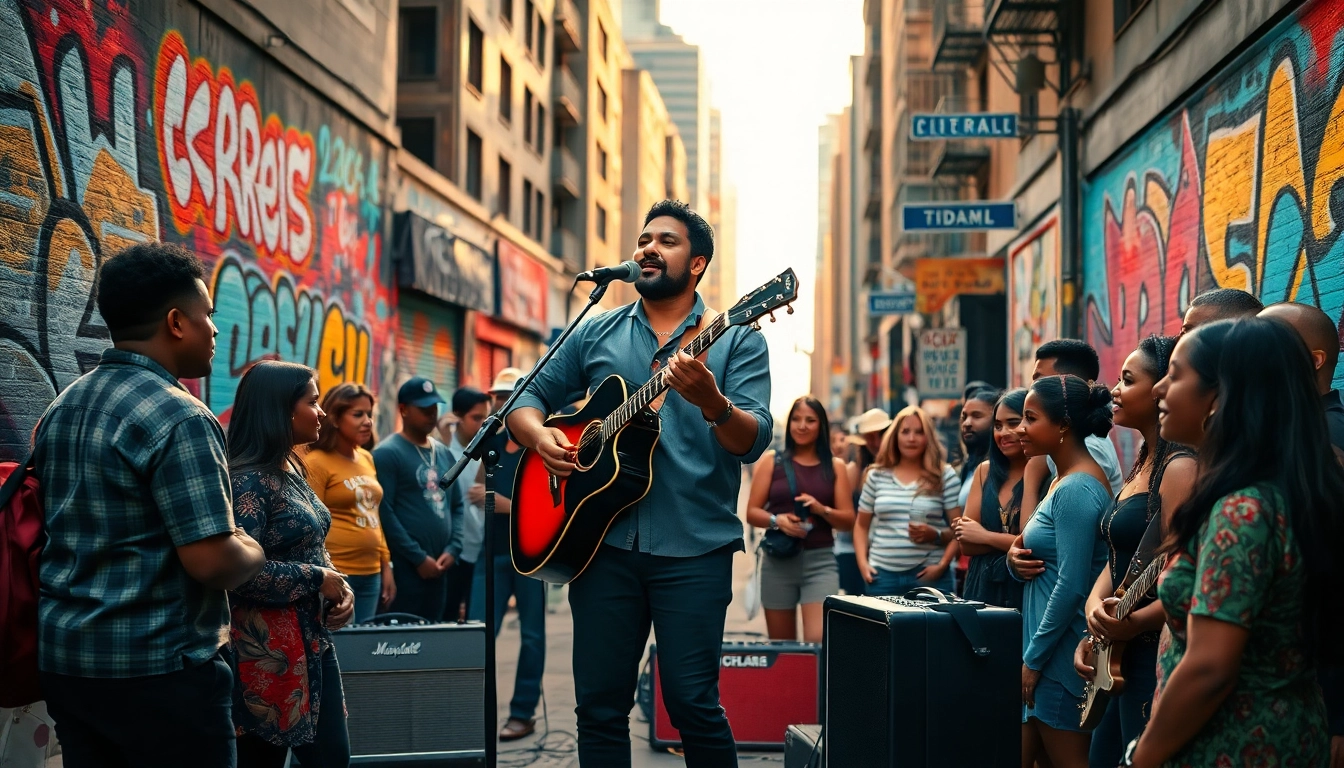
The Role of Music in Social Commentary
Music has served as a powerful tool for social commentary throughout history, articulating the struggles and aspirations of individuals and communities. From protest songs of the 1960s to contemporary hip-hop narratives, artists have leveraged the emotive nature of music to convey critical societal messages. Understanding this intersection of art and activism can illuminate the ongoing conversations around Social Commentary in modern music, reflecting how artists navigate cultural landscapes while addressing pressing issues.
Historical Context of Music as Social Commentary
The roots of music as social commentary can be traced back to various cultural traditions, but it gained significant traction during the 20th century. Landmark movements such as the Civil Rights Movement in the United States saw songs like “We Shall Overcome” becoming anthems for change. This era highlighted how musical expressions could unify and inspire collective action, embodying a vehicle for activism. As technology evolved, so did the means through which music was produced and distributed, allowing diverse voices to reach wider audiences and challenge social norms.
Key Themes in Music-Based Social Commentary
Social commentary in music often revolves around central themes such as inequality, injustice, war, and identity. Artists like Bob Dylan, Billie Holiday, and Public Enemy have explored these themes through their work, evoking a deep emotional response from audiences. Songs that discuss systemic racism, gender equality, and environmental concerns not only highlight these issues but also encourage listeners to engage critically with them. These themes resonate deeply across generations, proving the enduring power of music as a form of social discourse.
Influential Artists and Their Contributions
Various artists have redefined social commentary through their unique musical lenses. For instance, Nina Simone used her platform to confront racial injustice, exemplified in her song “Mississippi Goddam.” Similarly, Kendrick Lamar’s work often explores issues of race and identity, promoting dialogue about police brutality and systemic oppression. These artists and many others leverage their talents, often intertwining personal experiences with broader societal reflections, thus amplifying the impact of their messages.
Analyzing Lyricism in Social Commentary
Dissecting Lyrics: Messages Behind the Music
Lyrical analysis is critical in understanding how songs convey social commentary. The lyrics often serve as pivotal vehicles conveying straightforward messages or more subtle undertones. For example, the song “Fight the Power” by Public Enemy articulates a strong resistance against racial oppression, using direct language that prompts action. Conversely, Joni Mitchell’s “Big Yellow Taxi,” while catchy, conveys a poignant message about environmental degradation. Analyzing the context, word choice, and emotional weight behind lyrics enables listeners to grasp the deeper implications meant by the artist.
Symbolism and Metaphors in Lyrics
Symbolism and metaphors frequently enrich lyrical content, allowing artists to communicate complex ideas in a relatable manner. For instance, in her song “Fast Car,” Tracy Chapman employs the metaphor of a car to symbolize escape and freedom, reflecting wider societal themes of poverty and the desire for a better life. Understanding these literary devices enhances listeners’ appreciation for the artistry involved and deepens their engagement with the song’s message.
Case Studies of Impactful Songs
Examining specific songs provides valuable insights into the mechanisms of social commentary. One powerful case study is “This Is America” by Childish Gambino. The song juxtaposes upbeat melodies with dark themes of gun violence and racial inequality, compelling listeners to confront harsh realities against a backdrop of dancing and celebration. This contrast serves to disarm and engage audiences, forcing critical reflection on the societal issues it addresses. Another example is “Same Love” by Macklemore, which advocates for LGBTQ+ rights and acceptance, illustrating how music can foster empathy and understanding.
The Impact of Social Commentary in Modern Music
Music Festivals as Platforms for Social Issues
Music festivals have transformed into potent platforms for social issues, with artists frequently using their performances to raise awareness about various causes. Events like Coachella and Glastonbury now incorporate social justice themes, encouraging attendees to engage with these issues through workshops and discussions. The power of live music coupled with social activism creates memorable experiences that can galvanize audiences into action long after the music ends.
Audience Reactions and Engagement
The reception of socially charged music varies widely, reflecting the diverse perspectives within audiences. While some listeners embrace these messages, others may resist or critique them. Understanding audience engagement is crucial; studies indicate that emotionally resonant music can provoke thoughtful discussions and inspire grassroots movements. By analyzing responses to controversial songs, we gain insights into how music functions both as entertainment and as a catalyst for social change.
Measuring the Impact of Music on Social Change
Quantifying the impact of music-based social commentary on societal change raises complex questions. Metrics may include increased activism, social media engagement, or shifts in public opinion on specific issues. Case studies, surveys, and sociological research are instrumental in mapping these impacts. Artists and organizations that harness music for activism can utilize these insights to refine their strategies and enhance their outreach, illustrating music’s potential as a transformative force in society.
Challenges Faced by Artists in Delivering Social Commentary
Censorship and Artistic Freedom
Artists often face significant barriers when attempting to express critical social commentary. Censorship, whether from government entities or record labels, can stifle creativity and limit the breadth of discussion surrounding important topics. A poignant example is the backlash against the Dixie Chicks following their criticism of the Iraq War, highlighting the potential for professional consequences when artists challenge dominant narratives. Navigating these challenges requires resilience and creativity, as artists find ways to speak their truth without compromising their message.
Balancing Commercial Success with Message Integrity
The struggle to maintain authenticity while achieving commercial success is another challenge artists face. Many find themselves in a dilemma: should they temper their messages to appeal to broader audiences, or should they stay true to their convictions at the risk of alienation? This tension is evident in numerous case studies, including artists who have adopted softer lyrical tones or broader themes to maintain marketability while attempting to retain their core messages. Striking this balance is essential for sustainability in an industry often driven by sales over substance.
Public Reception and Diverging Opinions
The diverse opinions surrounding socially charged music can lead to polarization among audiences. While some praise artists for their courage and advocacy, others may criticize or dismiss their efforts as insincere or even exploitative. Artists must navigate these treacherous waters delicately, as a misstep could damage their reputation or alienate portions of their fan base. Engaging in dialogue with listeners and fostering understanding can help mitigate backlash, ensuring that their messages resonate more deeply.
The Future of Social Commentary in the Music Industry
Emerging Genres and Styles
As music evolves, so too do the genres and styles that artists use to convey social commentary. Genres like trap and reggaeton have emerged as significant avenues for storytelling about social issues, often reflecting the complexities of urban life and cultural identity. Additionally, the blending of genres allows for innovative approaches to social commentary, creating hybrid styles that appeal to diverse audiences while delivering potent messages.
The Role of Technology in Music and Social Commentary
Technology has profoundly altered how music is created, distributed, and consumed, which significantly impacts social commentary. The rise of social media has made it easier for artists to share their messages with global audiences, while streaming services allow for diverse voices and indie artists to rise. Moreover, technology facilitates collaboration across genres and geographies, fostering a collaborative spirit that can enhance social discourse in ways previously unimaginable.
Paving the Way for New Voices and Perspectives
The future of social commentary in music will likely involve emerging artists who bring fresh perspectives to bear on relevant issues. As platforms continue to democratize music distribution, new voices can rise to prominence, challenging established norms and inviting discussions that may have previously been marginalized. Supporting these artists not only enriches the music landscape but also fosters a dynamic dialogue on pressing social issues, paving the way for a more inclusive and engaged future.







